#frank mugisha
Text
#botswana#south africa#angola#lesotho#mozambique#seychelles#nigeria#kenya#cameroon#bisi alimi#Kasha Nabagesera#uganda#Mikael Owunna#Richard Akuson#Zanele Muholi#Frank Mugisha#Shrouk El-Attar#egypt#Unoma Azuah#OluTimehin Kukoyi
20 notes
·
View notes
Link
7 notes
·
View notes
Link
“ Lively, whose ministry had taken root in Uganda, was not acting alone, but rather with the support of a network of radical evangelical organizations that support homophobic campaigns in the US and abroad. “We were fortunate that some of our partners here in the United States were willing to work with us and help us. So we approached the Center for Constitutional Rights and were like, ‘Can we bring a lawsuit against Scott Lively,’” Mugisha said, explaining the start of a five-year legal battle to hold Lively accountable for his detrimental actions in Uganda. “
0 notes
Text
#democracy now#frank mugisha#uganda#lgbtq positivity#lgbt representation#lgbtq community#trans pride#transgender#transisbeautiful#anti gay laws
0 notes
Text
youtube
UGANDA TODAY; America Tomorrow?
You Folks Better Be About Getting Out the Vote This Year or This Could Be Our Future!
Yes, It Can Happen Here in America Too... 100%

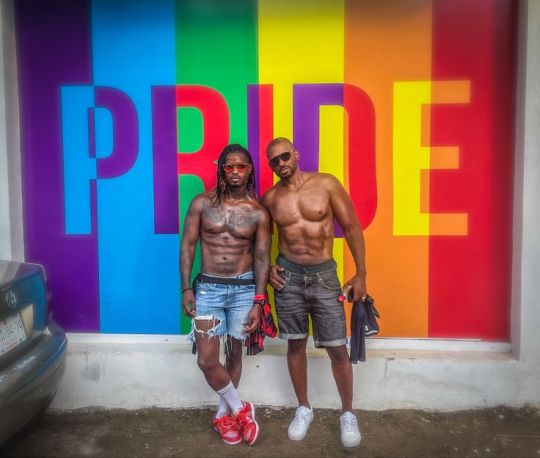

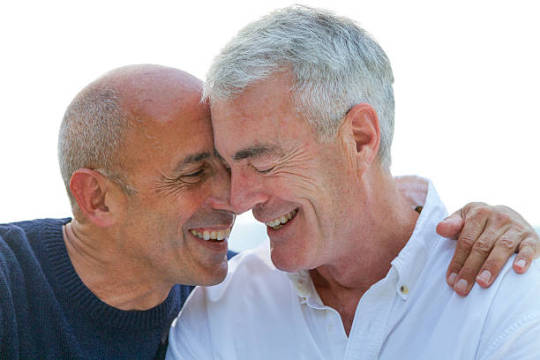

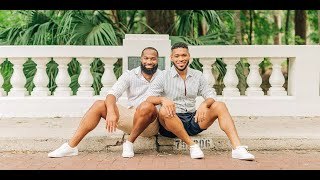




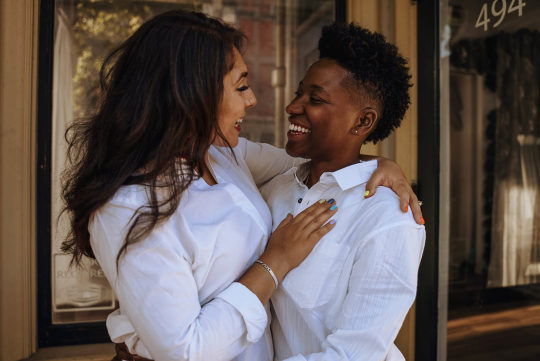

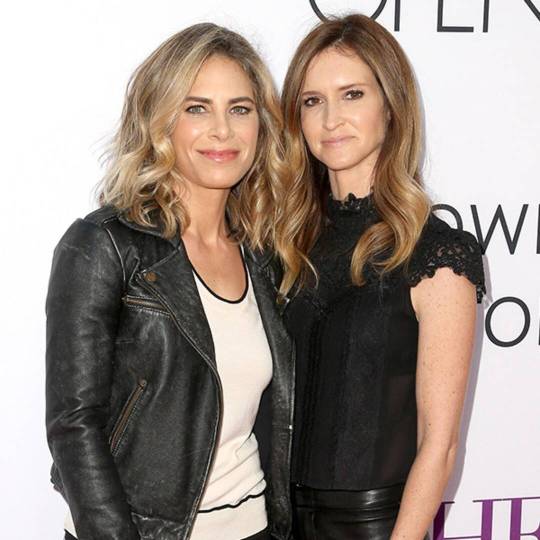
If You Cherish the Right to Love Who You Want to Love; You Have to Fight to Keep the Right to Love Who You Want to Love...
Freedom Ain't Free, Y'all!
Hell Yeah, I'm Partisan...
Vote for President Biden!!!
4 notes
·
View notes
Text
My heart goes out to the LGBTQIA+ people of Uganda, & to those who love them. And I am sickened by the shameful role white evangelical groups played in supporting this hateful and harmful legislation.
For more about the shameful role of US evangelical organizations in advocating for the repression of LGBTQIA+ folks in Uganda, here's a March 2023 interview by Rachel Maddow with Ugandan LGBTQIA+ advocate Frank Mugisha.
youtube
9 notes
·
View notes
Text
Kenyan authorities were wrong to ban the gay community from registering a rights organisation, the country's Supreme Court has ruled.
Yet at the same time it stressed that gay sex remains illegal.
The judges ruled three-to-two that the country's NGO board was wrong to stop the National Gay and Lesbian Human Rights Commission (NGLHRC) from registering in 2013.
As Kenya's highest court, the Supreme Court's ruling cannot be overturned.
In their judgment, the judges ruled that "it would be unconstitutional to limit the right to associate, through denial of registration of an association, purely on the basis of the sexual orientation of the applicants".
Nevertheless, the ruling is bitter-sweet for Kenya's gay community. Laws which were introduced under British colonial rule mean that it is criminal to have sex that "is against the order of nature", which can result in up to 14 years in prison.
In May 2019, Kenya's high court rejected an attempt to overturn these laws.
Africa Live: Latest update from around the continent
'Why our fight for gay rights in Kenya isn't over'
Where it's illegal to be gay
Friday's judgement ends a 10-year legal battle which began in 2013 when Eric Gitari, the former executive director of the NGLHRC, challenged the head of Kenya NGO Coordination Board's refusal to permit him to apply to register an NGO under a name containing the words gay or lesbian.
The judges ruled in his favour at the High Court in 2015, again at the Court of Appeal in 2019 and finally in 2023.
Speaking after the ruling, Njeri Gateru, the current executive director of the NGLHRC, said: "The Supreme Court's decision to uphold the lower courts' rulings is a triumph for justice and human rights.
"At a time where the Kenyan LGBTIQ+ community is decrying the increased targeting and violence; this decision affirms the spirit and intention of the Constitution to protect all Kenyans and guarantee their rights."
The ruling comes at a time when homophobic rhetoric has been rising in Kenya.
Members of the LGBTQI+ community have been harassed by police, subjected to body examinations to "prove" gay sex, and openly insulted on social media and in public spaces. Some say they have even been denied healthcare and thrown out of rental houses for being gay.
On the day of the judgement, Member of Parliament George Peter Kaluma filed an official notice that he intended to introduce a bill which would jail for life people convicted of homosexuality or the promotion of it.
While Friday's Supreme Court ruling arguably torpedoes any attempts to legally harass openly gay people with new laws, Mr Kaluma can still rally MPs to increase jail terms for gay sex.
It is also illegal to have gay sex in neighbouring Uganda, where Muslim leaders used Friday prayers to preach against homosexuality.
The head of the country's Muslims, Mufti Sheikh Ramathan Mubajje, called on the authorities to enact even tougher laws against same-sex relations.
He was speaking at the Old Kampala mosque in the capital, Kampala, where hundreds had gathered for Friday prayers.
Earlier in the week, the Uganda Muslim Supreme Council circulated a letter to all clerics under its association gazetting Friday as the day to carry out peaceful protests against homosexuality in Uganda.
The clerics were asked to prepare sermons condemning same-sex relations and extend the same message to the media and schools.
In the event, the protests were only held in the eastern city of Jinja.
Gay rights activist Frank Mugisha described the protests as dangerous, saying they could increase cases of violence against those who identify as LGBT.
There has been a recent surge in homophobic sentiment in the country.
Last week, President Yoweri Museveni said Uganda would not embrace homosexuality and that the West should stop trying to impose its views and "normalise" what he called "deviations".
3 notes
·
View notes
Text
Uganda LGBTQ leader says gay bill threatens homelessness
Comment on this story
Comment
KAMPALA, Uganda — A prominent leader of Uganda’s LGBTQ community said Thursday he was worried about becoming “homeless,” describing anguished calls by others like him who are concerned for their safety after the passing of a harsh new anti-gay bill.
“I am worried about being evicted,” said Frank Mugisha, head of the banned LGBTQ support group Sexual Minorities…
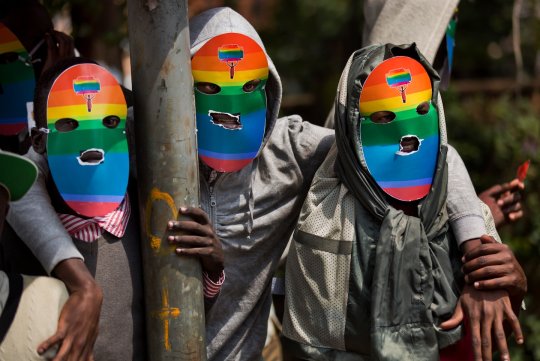
View On WordPress
0 notes
Text
Ouganda : le Parlement débat d'une loi controversée anti-LGBT
Le Parlement ougandais doit voter mardi sur une loi répressive prévoyant jusqu'à dix ans de prison pour celles et ceux qui entretiendraient des relations homosexuelles, dénoncée par des défenseurs des droits humains.
Le texte cible toute personne se livrant à des activités homosexuelles ou se revendiquant comme LGBTQ+, dans un pays où l'homosexualité est déjà illégale.
"Le projet de loi contre l'homosexualité est prêt et sera déposé devant le parlement pour un vote cet après-midi", a déclaré mardi à l'AFP Robina Rwakoojo, présidente de la Commission des affaires juridiques et parlementaires qui a étudié le projet de loi.
"Nous avons entendu les partisans du projet de loi et ceux qui s'y opposent et nous avons fait nos recommandations pour examen par la plénière", a-t-elle poursuivi.
Ce vote sur ce projet de loi survient à un moment où les théories conspirationnistes sur le sujet foisonnent sur les réseaux sociaux, accusant d'obscures forces internationales de faire la promotion de l'homosexualité en Ouganda.
Quelques jours avant l'examen du projet de loi par les parlementaires, le président Yoweri Museveni, qui dirige le pays d'Afrique de la région des Grands lacs d'une main de fer depuis 1986, avait qualifié les homosexuels de "déviants".
Le 17 mars, la police ougandaise avait annoncé l'arrestation de six hommes pour "pratique homosexuelle".
Fox Odoi-Oywelowo, parlementaire appartenant tout comme le chef de l'Etat au Mouvement de résistance nationale, a déclaré de son côté s’opposer au texte, affirmant à l'AFP vouloir "promouvoir une société juste".
Ce projet de loi "contient des dispositions anticonstitutionnelles, annule les acquis enregistrés dans la lutte contre les violences basées sur le genre", a-t-il déclaré mardi devant le Parlement, pendant que plusieurs de ses collègues tentaient de couvrir son intervention.
Adrian Jjuuko, avocat et militant pour la défense des droits humains, a déclaré espérer que le Parlement "n'adopte pas cette loi car elle aggraverait les discours de haine contre les minorités".
L'Ouganda a une stricte législation anti-homosexualité - un héritage des lois coloniales - mais depuis l'indépendance du Royaume-Uni en 1962, il n'y a eu aucune poursuite pour des actes homosexuels consentis.
En 2014, un tribunal ougandais avait bloqué un projet de loi, approuvé par les députés et signé par le président Museveni, pour punir les relations homosexuelles de prison à vie. Ce texte avait suscité un tollé au-delà des frontières ougandaises, certains pays riches ayant suspendu leur aide après sa présentation au Parlement.
Le chef de l'Etat "a historiquement pris en compte les dommages causés par les projets de loi, notamment en termes de relations avec l'Occident et de financement des donateurs", a déclaré Kristof Titeca, expert des affaires d'Afrique de l'Est à l'Université d'Anvers (Belgique).
Ce vote en Ouganda intervient également dans un contexte de virulente vague d'homophobie en Afrique de l'Est, où l'homosexualité est illégale et souvent considérée comme un crime.
Frank Mugisha, directeur de la principale organisation ougandaise de défense des droits des homosexuels suspendue l'année dernière par les autorités, Sexual Minorities Uganda, avait déclaré en mars à l'AFP avoir été inondé d'appels de personnes LGBTQ+ au sujet du nouveau projet de loi car ils "vivent dans la peur".
0 notes
Text
Țara care a adoptat pedeapsa cu moartea sau închisoarea pe viață pentru persoanele din comunitatea LGBTQ
Legea interzice promovarea și favorizarea homosexualității.
„Este vorba de suveranitatea națiunii noastre, nimeni nu trebuie să ne șantajeze, nimeni să nu ne intimideze.”
Frank Mugisha, un activist proeminent LGBTQ din Uganda, a denunțat legislația ca fiind draconiană.
Parlamentul Ugandei a adoptat marți o lege care face o infracțiune identificarea drept LGBTQ, dând autorităților puteri largi de…

View On WordPress
0 notes
Text
Uganda activist Frank Mugisha: 'I hope the church in Africa starts working with us' now that the Pope has declared God's love for LGBTQ+ people,
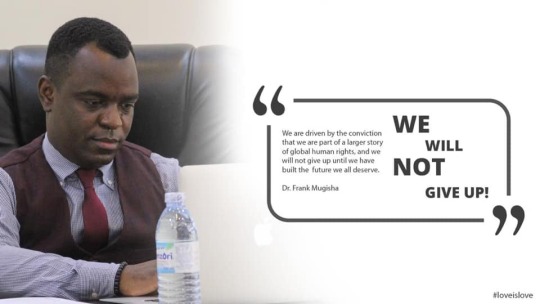
0 notes
Text
FRAUD ALERT: Belgium Based Anti Fraud Activist Kwikiriza Pins City Businessman Mwine In A String of Scams
Popular Beligium based Ugandan YouTuber Kwikiriza Bruce aka Bruce-chris has pinned City con businessman Frank Mwine Mugisha on a series of high profile frauds against Ugandans both locally and those abroad.
Kwikiriza, the proprietor of a YouTube channel platform- Brucechris1that promotes anti fraud awareness to Ugandans both at home and abroad claims he was robbed ten million Shillings by Mr…
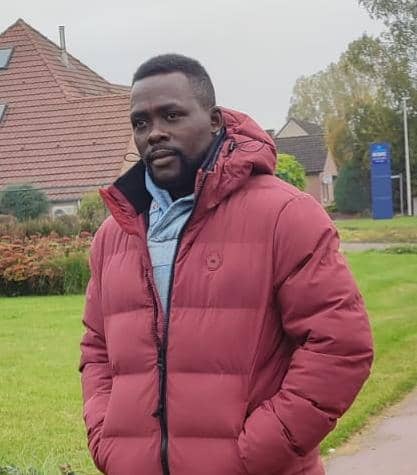
View On WordPress
0 notes
Text
#matthew blaise#Freddie Jacob#Uyaiedu Ikpe-Etim#nigeria#Kevin Mwachiro#kenya#Bandy Kiki#cameroon#Alex Kofi Donkor#ghana#Frank Mugisha#uganda
21 notes
·
View notes
Photo

Frank Mugisha
Gender: Male
Sexuality: Gay
DOB: 17 June 1979
Ethnicity: African - Ugandan
Occupation: Activist
Note: One of the most prominent advocates for LGBT rights in Uganda.
61 notes
·
View notes
Text
Frank Mugisha: A LGBTQ+ Biography By The Ubuntu Bio Project
Frank Mugisha: A LGBTQ+ Biography By The Ubuntu Bio Project

Dr. Frank Mugisha was born on June 17, 1979. He is a prominent advocate for the rights of sexual minorities in Uganda, a respected champion of human rights, and an anti-violence advocate. Mugisha was a 2014 nominee for the Nobel Peace Prize, and in 2017, was included in “Fortune” magazine’s list of the world’s greatest leaders.
Frank Carlton Mugisha was born in a suburb of Kampala, Uganda, and…
View On WordPress
0 notes
Photo
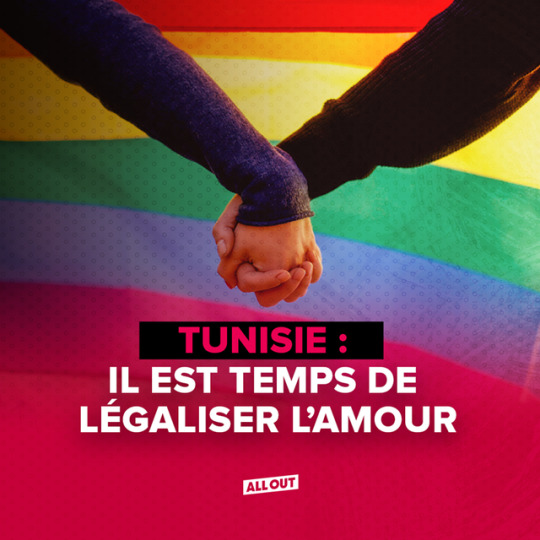
À l’attention de : Béji Caïd Essebsi, Président de la République tunisienne.
Monsieur le Président,
Le 13 août 2017, vous avez créé la Commission des libertés individuelles et de l’égalité et l’avez chargée de recommander des « réformes relatives aux libertés individuelles et à l’égalité conformément à la Constitution du 27 janvier 2014, aux normes internationales relatives aux droits de l’homme et aux orientations contemporaines dans le domaine des libertés et de l’égalité ».
Dans son rapport publié le 12 juin 2018, la Commission a clairement recommandé l’abrogation de l’article 230 du Code pénal, qui criminalise les actes homosexuels, et d’interdire les tests anaux, une méthode discréditée utilisée dans le cadre judiciaire sur des hommes soupçonnés d’être homosexuels.
En 2017, au moins 71 arrestations ont eu lieu en vertu de l’article 230 ; il y a seulement quelques jours, un jeune homme a été condamné à 4 mois de prison pour avoir échangé des messages romantiques en ligne avec un autre homme. L’article 230 alimente les discriminations et les violences, et il est temps d’y mettre un terme.
Monsieur le Président, nous vous demandons de saisir cette opportunité remarquable d’adopter une législation abrogeant l’article 230 du Code pénal tunisien et interdisant les tests anaux.
Cette mesure législative est cruciale pour répondre aux exigences de la Constitution tunisienne du 27 janvier 2014 et harmoniser la législation tunisienne avec les normes internationales en matière des droits de l’homme.
Nous vous prions, Monsieur le Président de la République, l’expression de notre très haute considération.
Mounir Baatour, Shams – Pour la dépénalisation de l'homosexualité en Tunisie
Matt Beard, All Out
Anastasiia Danilova, GENDERDOC-M Information Centre, Moldova
John O’Doherty, The Rainbow Project, Ireland
Leonardo Monaco, Associazione Radicale Certi Diritti, Italy
Costa Gavrielides - Adviser for Multiculturalism, Acceptance and Respect for Diversity to the President of Cyprus.
Vladimiras Simonko, Asociacija LGL, Lithuania
Sebastiano Secci, Mario Mieli | Circolo di Cultura Omosessuale, Italy
Edwin Sesange, African Equality foundation, the UK
Frank Mugisha, Sexual Minorities Uganda - SMUG
Maxwell W. Monboe, Liberia's Initiative for the Promotion of Rights,Identity Diversity and Equality (LIPRIDE), Liberia
Ifeanyi Orazulike, International Center for Advocacy on Right to Health - ICARH, Nigeria
Françoise Mukuku, Si jeunesse savait, Republique Democratique du Congo
Lana Gobec, Legebitra, Slovenia
Luswata Andrew Brant, IceBreakers Uganda
Hazan Kahrizi, Alwan for LGBT rights in the Middle East and North Africa, Iraq
Amir Mukambetov, LGBT organization Kyrgyz Indigo, Kyrgyzstan
Akudo Oguaghamba - Women's Health and Equal Rights Initiative, (WHER) Nigeria
Alexandre Marcel, Comité idaho, France
Steve Letsike, Access Chapter 2, South Africa
Busingye Louis, Human Rights First Rwanda Association, Rwanda
Frederic Hay, ADEHOS, France
Olfa Youssef, universitaire et islamologue, Tunisie
Symmy Larrat, ABGLT, Brazil
Karim Belhadj, cinéaste, Tunisie
Paul Dillane, Kaleidoscope Trust, the UK
Ruth Muganzi, Kuchu Times Media Group, Uganda
Qwin Mbabazi Fiona and Fokeerbux Najeeb Ahmad, African Queer Youth Initiative
Jérémie SAFARI, Rainbow Sunrise Mapambazuko Democratic Republic of the Congo
Ronald Céspedes, Fundación Diversencia, Bolivia
Olivier King SIBO, MOLI, Burundi
Ivan Hinton-Teoh, just.equal, Australia
Mitch Yusof, SEED, Malaysia
Wei-Cheng Lin, Taiwan Tongzhi (LGBTQ) Hotline Association, Taiwan
Nkali Biggie, FARUG, Uganda
Midnight Poonkasetwattana, APCOM, Thailand
Joey Siosaia Joleen Mataele, Tonga Leiti's Association, Kingdom of Tonga
Hadi Damien, Beirut Pride, Lebanon
Celestine Peter, lawyer, Tanzania
Muriel Yvon, Collectif Arc en Ciel, Mauritius
Jinan Limam, ADLI, Tunisie
Chad Wilkinson, Rainbow Foundation of Hope, Vancouver, Canada
Marylize Biubwa - Member Femnet and Activista, Kenya
10 notes
·
View notes